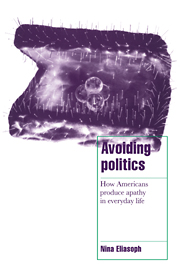Book contents
- Frontmatter
- Contents
- Acknowledgments
- 1 The mysterious shrinking circle of concern
- 2 Volunteers trying to make sense of the world
- 3 “Close to home” and “for the children”: trying really hard not to care
- 4 Humor, nostalgia, and commercial culture in the postmodern public sphere
- 5 Creating ignorance and memorizing facts: how Buffaloes understood politics
- 6 Strenuous disengagement and cynical chic solidarity
- 7 Activists carving out a place in the public sphere for discussion
- 8 Newspapers in the cycle of political evaporation
- 9 The evaporation of politics in the US public sphere
- Appendix 1 Class in the public sphere
- Appendix 2 Method
- Notes
- References
- Index
- Titles in the serious
5 - Creating ignorance and memorizing facts: how Buffaloes understood politics
Published online by Cambridge University Press: 17 November 2009
- Frontmatter
- Contents
- Acknowledgments
- 1 The mysterious shrinking circle of concern
- 2 Volunteers trying to make sense of the world
- 3 “Close to home” and “for the children”: trying really hard not to care
- 4 Humor, nostalgia, and commercial culture in the postmodern public sphere
- 5 Creating ignorance and memorizing facts: how Buffaloes understood politics
- 6 Strenuous disengagement and cynical chic solidarity
- 7 Activists carving out a place in the public sphere for discussion
- 8 Newspapers in the cycle of political evaporation
- 9 The evaporation of politics in the US public sphere
- Appendix 1 Class in the public sphere
- Appendix 2 Method
- Notes
- References
- Index
- Titles in the serious
Summary
Since the “private people” at the country-western clubs so rarely talked politics at the clubs – where they spent nearly all of their free time – members had little or no companionship in developing methods for analyzing politics. How do people like the Buffaloes, who had so little opportunity to talk politics, ever learn to think about politics? Interviewing them showed me just how risky and strange it was for most members to talk politics. This chapter reports on ten interviews and backstage political conversations with country-westerners. What most overwhelmed me in the interviews with this group was that their political worries, though often strong, were far-flung, even eccentric, not overlapping with other members' concerns. For example, Charlene had been so worried about nuclear war in the early 1980s, she read a book about how to grow potatoes in underground caves and live in the Yukon, “because of wind patterns making it a place fallout wouldn't land”; another member devoted a large portion of our interview to his worry that we receive radioactive rays from light bulbs and toasters. Another “would fear for [her] health” if she were to become politically involved, giving as an example a popular docudrama about whistleblower Karen Silkwood, killed by the nuclear power company whose crimes she exposed. These varied worries almost never made it to everyday conversation. Country-westerners were worried – sometimes devoured by worries – but they did not talk about their concerns, and so experienced them as purely unusual, personal fears that demanded purely personal strategies to vanquish.
- Type
- Chapter
- Information
- Avoiding PoliticsHow Americans Produce Apathy in Everyday Life, pp. 131 - 153Publisher: Cambridge University PressPrint publication year: 1998

